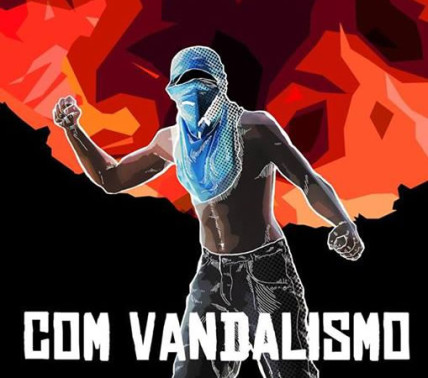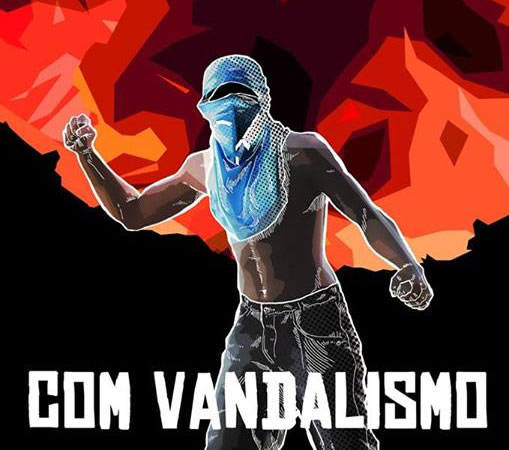
Vandalism movie poster
Among the people marching on the streets of Fortaleza, Brazil to protest the government recently, there was a small group of four journalists, from Coletivo Nigéria (Nigeria Collective), with cameras in hand ready to document everything. The result of this work became an independent film called “Vandalism”.
The crisis of credibility faced by traditional Brazilian press with the protesters has provoked a narrative change, forcing the mass media to open up some space to the “mass of medias” emerging from the streets. Together with the live broadcasting by Midia Ninja, a group of independent journalists [en], videos recorded during the protests turned out to be the official language of the protests, from north to south of the country. Though few of them were capable of summarizing the essence of the national revolt as “Vandalism” has done.
Through low-edited images and long sequences, the film criticizes the traditional media’s framing of the protesters as pacifists versus vandals and shows the other side of the protests, discussing the causes before the consequences. The challenge posed by the filmmakers since the first scene is: “What is the motivation for civil disobedience?”
In spite of showing only facts that took place in Fortaleza, Ceara between the months of June and July, 2013, the film serves as a wider panorama on what happened throughout the entire country. The documentary follows the demonstrations’ evolution in the northeastern city, from the beginning when students took the streets to protest the delay on the delivery of their student cards, and continues on as it soon evolved into bigger claims such as public health, education and politics. As it has happened in other states, the more people gathered on the streets, more divided and confused the protests and their motivations became.
While the press and the police cry vandals, the filmmakers show the opposite side against the backdrop of the protesters’ cry: “The vandal is the state”. In the movie, this counterpoint helps to create awareness for subjects such as the land expropriations in favour of the World Cup construction and the violence practiced by the military police, among others.
Agencia Publica, an independent investigative journalism agency [en]who has worked with Nigeria, rated the film as:
A report/reflection produced within the heat of the moment, where the chronology of facts, the variety of angles, people interviewed, and the journalists’ sobriety contribute to create a complete panorama of the protests in Fortaleza, revealing to those who search to understand who this youth that occupied the streets in several major Brazilian cities is what what they want.
Watch “Vandalism” with English subtitles here:
Written and translated by Fernanda Canofre




